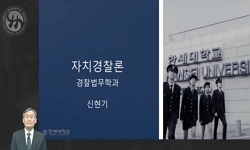Following the 2020 amendment to the Criminal Procedure Act, the investigative authority, which was previously concentrated with prosecutors, has been adjusted. This adjustment has significantly expanded the primary investigative authority and autonomy...
http://chineseinput.net/에서 pinyin(병음)방식으로 중국어를 변환할 수 있습니다.
변환된 중국어를 복사하여 사용하시면 됩니다.
- 中文 을 입력하시려면 zhongwen을 입력하시고 space를누르시면됩니다.
- 北京 을 입력하시려면 beijing을 입력하시고 space를 누르시면 됩니다.

절차적 정의에 관한 국민의 인식이 경찰 수사권 지지에 미치는 영향 = A Study on the Impact of Public Perception of Procedural Justice on Support for Police Investigative Authority
한글로보기https://www.riss.kr/link?id=A109541843
-
저자
오규철 (영산대학교 경찰행정학과)
- 발행기관
- 학술지명
- 권호사항
-
발행연도
2024
-
작성언어
Korean
-
주제어
Procedural Justice ; Police ; Investigative Authority ; Public Perception ; Public Support ; 절차적 정의 ; 경찰 ; 수사권 ; 국민 인식 ; 지지(支持)
-
등재정보
KCI등재
-
자료형태
학술저널
-
수록면
189-222(34쪽)
- DOI식별코드
- 제공처
-
0
상세조회 -
0
다운로드
부가정보
다국어 초록 (Multilingual Abstract)
The study results indicate that both public expectations and demands for procedural justice significantly influence support for police investigative autonomy. In the case of support for investigative conclusion authority, procedural expectations were found to have a significant impact. Based on these results, the study suggests that, in addition to adhering to procedural limits according to legal principles, it is necessary to improve procedural attitudes towards counterparts, enhance police investigative expertise through the expansion and strengthening of professional personnel and education, and maintain and strengthen the fairness and neutrality of police investigative authority through legal and institutional improvements.
Following the 2020 amendment to the Criminal Procedure Act, the investigative authority, which was previously concentrated with prosecutors, has been adjusted. This adjustment has significantly expanded the primary investigative authority and autonomy of the police, and granted them the authority to not forward cases, thereby allowing the police to secure part of the investigative conclusion authority. The exercise of investigative authority, particularly within the criminal justice system, is a process of imposing the state's punitive power, which strongly restricts freedom and rights. It also has a strong procedural nature in terms of realizing criminal procedure in practice. Therefore, it is crucial to ensure procedural legitimacy along with substantive justice and to comply with the rule of law as stipulated in the Constitution. This legitimacy can be evaluated through the trust and support of citizens. This study aims to empirically verify the extent to which the public expects and demands procedural justice in the exercise of police investigative authority, and how this perception affects support for police investigative authority and conclusion authority. Based on theoretical and criminal justice law grounds for procedural justice, the study collected and restructured public perception survey data on investigative structure reform for analysis and discussion.
The study results indicate that both public expectations and demands for procedural justice significantly influence support for police investigative autonomy. In the case of support for investigative conclusion authority, procedural expectations were found to have a significant impact. Based on these results, the study suggests that, in addition to adhering to procedural limits according to legal principles, it is necessary to improve procedural attitudes towards counterparts, enhance police investigative expertise through the expansion and strengthening of professional personnel and education, and maintain and strengthen the fairness and neutrality of police investigative authority through legal and institutional improvements.
동일학술지(권/호) 다른 논문
-
경찰에 대한 가치관적 지지가 지역치안활동 참여의지에 미치는 영향: 경찰 신뢰의 매개효과를 중심으로
- 한국공안행정학회
- 전준하
- 2024
- KCI등재
-
- 한국공안행정학회
- 정우일
- 2024
- KCI등재
-
시민의 경찰정당성 인식이 AI CCTV 기술수용의사에 미치는 영향
- 한국공안행정학회
- 김도선
- 2024
- KCI등재
-
강간사건 처벌 판단에 피고인 및 피해자의 민족성과 판단자의 성별이 미치는 영향
- 한국공안행정학회
- 김유진
- 2024
- KCI등재




 KCI
KCI 스콜라
스콜라






